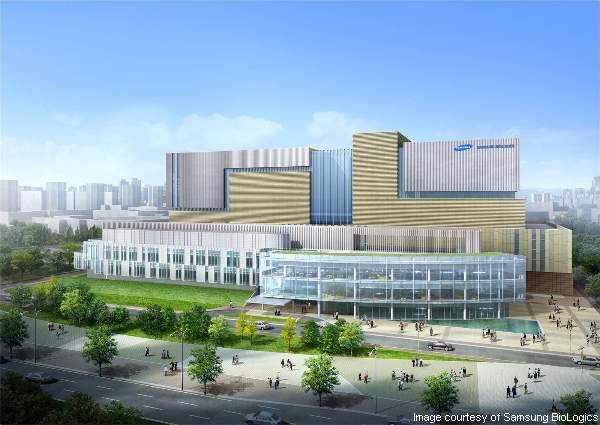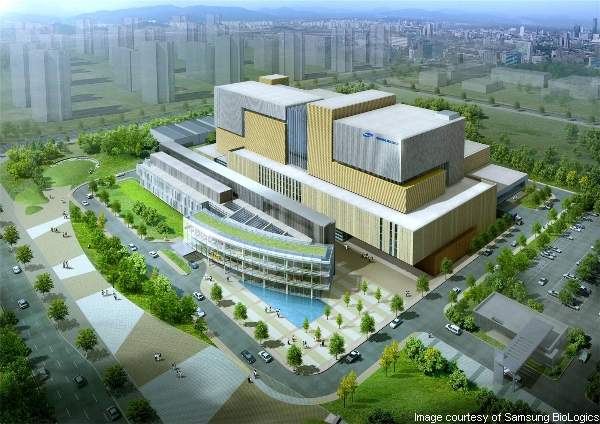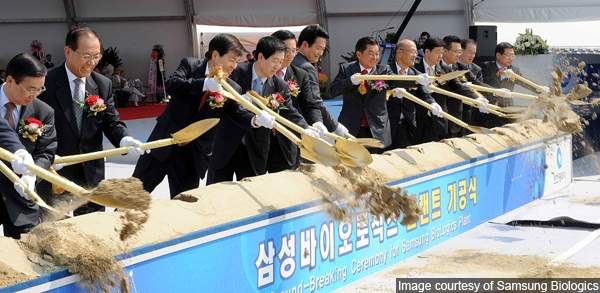South Korea-based company Samsung Biologics broke ground on its first manufacturing plant in the free economic zone in Songdo, Incheon, in May 2011.
Samsung Biologics is a joint venture established in April 2011 between Samsung Electronics (40%), Samsung Everland (40%), Samsung C&T (10%) and Quintiles Transnational (10%). Samsung Biologics invested $30m in the joint venture.
Samsung identified biologics among its new strategic businesses in 2010 and partnered with Quintiles Transnational. Samsung Biologics plans to invest KRW2.1tn ($1.96bn) to strengthen its position in the field of biopharmaceuticals.
The facility’s construction was completed in July 2013 and it received approval from the US Food and Drug Administration (FDA) to begin production in 2015. The facility is designed to comply with current good manufacturing practice (GMP) standards and currently employs around 300 people.
Specifications for the Samsung Biologics plant in Incheon
The state-of-the-art facility is spread over a 69,000m² area within a 274,000m² site, with ample space for future expansion.
Designed for multiproduct operations, the facility accommodates a cell culture hall, a research and development laboratory, an upstream suite, a downstream suite, a fill and finish suite, a warehouse and an administration building.
The cell culture hall is equipped with six 5,000l stainless-steel bioreactors and three individual trains, each capable of manufacturing 600kg of biopharmaceuticals. Each train is installed with two production reactors capable of batch and fed-batch operations.
The cell culture hall also has three 40l, three 200l and three 1,000l seed reactors. The cell culture suites operate in a grade C environment.
The site also houses dedicated automated glass washers and autoclaves, with two separate grade B inoculation suites to minimise the risk of cross-contamination and changeover time.
The downstream process GMP purification area houses four separate suites to improve flexibility and minimise turnover time. Each suite can be configured to suit client requirements.
The GMP purification area includes a column maintenance suite, a grade B classified bulk fill suite with grade A (laminar flow booth) bulk filling capacity and a buffer preparation suite. The temperature-controlled, high capacity buffer preparation suite holds tanks with ranging capacities.
Separate areas are dedicated for pre and post-viral equipment cleaning. Classified as grade C or higher, the suites are installed with chromatography skids, columns, ultrafiltration/diafiltration (UF/DF) skids and virus filtration skids.
The grade B filling area is installed with formulation, aseptic liquid filling, pre-filled syringe lyophilisation and packaging apparatus capabilities. The area is modular in design to support future expansion and accommodate additional pre-filled syringes, liquid fill and lyophilisation units.
The filling area also houses a washroom, media fill suite and 20,000ft² GMP warehouse designed with long-term cold storage capacity, as well as automated clean-in-place and sterilisation-in-place systems.
Sensitive zones are accessible via an air-lock vestibule with interlocks. The layout allows for the optimum flow of personnel, materials, samples, products and waste.
Production at the Incheon facility
The facility also undertakes contract manufacturing of biopharmaceuticals. Due to rising demand for biopharmaceuticals, Samsung Biologics expects to generate KRW1.8tn ($1.56bn) a year by 2020.
Expansion of the Samsung Biologics plant
The expansion programme included the construction of a second plant at the Songdo site by 2015. The new plant began operations in March 2016.
The expansion added six 15,000l bioreactors to the facility. Downstream capacity was also added with streamlined purification suites with pre and post-viral segregation.
In December 2015, Samsung broke ground on its third plant in Songdo’s free economic zone as part of its expansion plan. The plant is expected to begin production in 2018.





